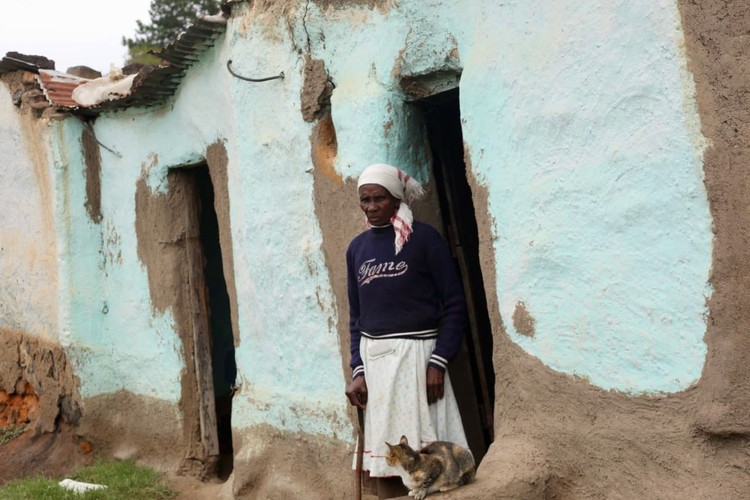81-year-old Mthatha widow waiting two decades for her house
Ndenzeni Njwenene first applied in 1999
Ndenzeni Njwenene is 81 and has waited over 20 years to receive the RDP house she was allocated. She lives in this crumbling home in Libode near Mthatha, Eastern Cape. Photo: Nombulelo Damba-Hendrik
- Ndenzeni Njwenene’s application for a house made in 1999 was approved and she was given an erf number in a housing development in 2002.
- She is 81 now, has never received the house, and she cannot get a straight answer from the Eastern Cape Department of Human Settlements.
- The department’s spokesperson Siyabonga Mdodi has ignored GroundUp’s repeated inquiries for nearly a month.
Ndenzeni Njwenene was already 60 years old when she was allocated an RDP house. Now, over 80, she continues to wait for her house, living in a crumbling, mud hovel in Libode near Mthatha, Eastern Cape.
She first applied for an RDP house in 1999. Then in 2002, the Eastern Cape Department of Human Settlement in Mthatha gave her an erf number, saying her application was approved and her house would be built in Mayden Farm.
Over two decades later, she is left holding only a piece of paper with “ERF 23822 Mayden Farm EXT” written on it.
She lives not far from the Corhana River in a three-roomed, self-built abode made of bricks she made with mud. The floor of the house is always wet. The tin roof leaks and it lifts in the wind.
She moved to the area after she lost her husband in the late 1980s and was left destitute. Her daughter was three years old. She is now 38 and lives with her mother. She has serious health issues. When we visited, she was sleeping.
She would have liked to live with her two granddaughters, but she sent them to stay with relatives because the house is in such bad condition.
Still working at 81, Njwenene makes bricks using mud mixed with ash and water. This is shaped in a mould, dried and baked. The process takes about a month. She sells the bricks for R1 each. People use them for their foundations.
The two women do not feel safe in their mud house because of previous attempted robberies. Njwenene takes her daughter with her to the brick-making area, a kilometre away. The brick dust and the smoke do not help her daughter’s asthma.
Njwenene has lost count of the many times she has gone to the housing officials in Mthatha.
“Each time when I go there, they would put my ID number in the computer. I would be told that my house is in Meyden Farm … They don’t even know if the house has been built or not. The minute I ask many questions they would tell me that their seniors are in a meeting, I must come back another day. Or they would take my number and promise to contact us, which they never did,” she said.
Last month, we reported on how the 1,000-house Meyden Farm housing development is to be investigated by the Hawks, how the houses were badly built or left unfinished, and how houses “rectified” years later were built just as badly the second time around.
Njwenene says it is too late for her, but she wants a proper house for her daughter and grandchildren.
“I’m old and I know my days are numbered. My prayer is to die after I have received the house. I don’t care if I don’t live much in it, so long as my children have a place that they can call home. I don’t want them to suffer like I did,” she said.
On 14 November, we sent questions to the provincial human settlements department. Media officer Phiwokuhle Soga said department spokesperson Siyabonga Mdodi was on leave that day, but she would follow it up. She promised again on 21 November.
We have sent email and other reminders to both of them on 17, 20 and 27 November and 7 December. WhatsApp messages have been blue ticked, but we still have no response.
Support independent journalism
Donate using Payfast

Don't miss out on the latest news
We respect your privacy, and promise we won't spam you.
Next: Pietermaritzburg station opens but train delayed 10 hours
Previous: Corrupt traffic cop’s sentence “laughable” says judge
© 2023 GroundUp. This article is licensed under a Creative Commons Attribution-NoDerivatives 4.0 International License.
You may republish this article, so long as you credit the authors and GroundUp, and do not change the text. Please include a link back to the original article.
We put an invisible pixel in the article so that we can count traffic to republishers. All analytics tools are solely on our servers. We do not give our logs to any third party. Logs are deleted after two weeks. We do not use any IP address identifying information except to count regional traffic. We are solely interested in counting hits, not tracking users. If you republish, please do not delete the invisible pixel.

